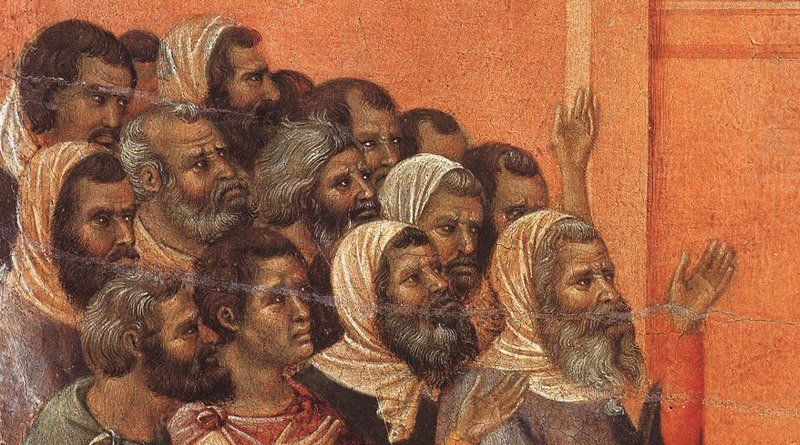Message of Abbot Paul - Saturday 20th November

Message from Fr Paul for Saturday, 20th November 2021
It’s always struck me that Jesus spends a lot of his time arguing with the scribes and Pharisees on the one hand and with the Sadducees on the other. In Luke’s Gospel, even at the age of twelve, he stayed behind in Jerusalem, instead of returning to Nazareth with Mary and Joseph, arguing with the doctors of the Law. In today’s Gospel passage from Luke, (Lk 20: 27-40), the Sadducees come forward and pose a question to Jesus on the question of resurrection and eternal life in order to start an argument. The discussion, therefore, is not about marriage, but about resurrection and life after death, in which the Sadducees did not believe. This is the question, rather a long and complicated one. “Master, we have it from Moses in writing, that if a man’s married brother dies childless, the man must marry the widow to raise up children for his brother. Well then, there were seven brothers. The first, having married a wife, died childless. The second and then the third married the widow. And the same with all seven, they died leaving no children. Finally, the woman herself died. Now, at the resurrection, to which of them will she be wife since she had been married to all seven?”
Why would resurrection be so important to Pharisees and other Jews? Part of the matter lies in which books of the Bible are considered to be inspired by God. The Sadducees worked only with the Pentateuch, the Torah, while the Pharisees and others read also the Prophets and Psalms as scripture, and it was in those extra books that Pharisees found justification for trusting in a resurrection of the dead. More important, perhaps, was the matter of the ultimate justice of the world. The Sadducees understood this world to be the only world in which God would act as a keeper of covenantal promises; the Pharisees understood that God would keep promises and enact justice even beyond the boundaries of this world, which was good and necessary because Rome quite clearly controlled this one and was clearly not going to pay back its injustices. This is a particularly important matter for Luke as he is writing after the tragic fall of Jerusalem in which a vast number of Jews were killed. The Sadducees’ argument seeks to make the idea of resurrection ridiculous, hence the story of the woman who was married to seven brothers.
Jesus’ reply is worth looking at. “The children of this world take wives and husbands, but those who are judged worthy of a place in the other world and in the resurrection from the dead do not marry because they can no longer die, for they are the same as the angels, and being children of the resurrection, they are sons of God. And Moses himself implies that the dead rise again, in the passage about the bush where he calls the Lord the God of Abraham, the God of Isaac and the God of Jacob. Now he is God, not of the dead, but of the living; for to him all men are in fact alive.” Jesus has been handed a case involving the complexities of levirate marriage, the patriarchal institution that protected women by passing them on from brother to brother. Jesus says that in the aeon to come, the aeon of resurrection and restitution, the whole institution of marriage will be unnecessary, and thus women will not be passed along as property, because in the age to come, people will not die. Why would that matter? It appears that Jesus understands the aeon of resurrection and restitution to have set aside the entire patriarchal structure that makes the possessing of women as property possible or even necessary because of our mortality. After that reply, no further questions are asked. With Jesus we, too, look forward to a future life in God’s presence where true justice for all, including women, will reign supreme.









